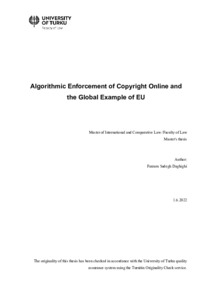Algorithmic Enforcement of Copyright Online and the Global Example of EU
Sadegh Daghighi, Farzam (2022-06-17)
Algorithmic Enforcement of Copyright Online and the Global Example of EU
Sadegh Daghighi, Farzam
(17.06.2022)
Julkaisu on tekijänoikeussäännösten alainen. Teosta voi lukea ja tulostaa henkilökohtaista käyttöä varten. Käyttö kaupallisiin tarkoituksiin on kielletty.
avoin
Julkaisun pysyvä osoite on:
https://urn.fi/URN:NBN:fi-fe2022081755638
https://urn.fi/URN:NBN:fi-fe2022081755638
Tiivistelmä
Today algorithms are present virtually in all aspects of life, and protecting online copyrighted content against infringement is no exception. Through a legal dogmatic and critical analysis, this work studies how algorithms are used on online platforms to protect authors' rights. The essential legislative element in this work is Copyright in Digital Single Market Directive in the EU. The study assesses the impacts of the directive’s article 17 on algorithmic enforcement of copyright by online content-sharing platforms. This includes understanding how already in-use algorithmic technologies and the voluntary ex ante enforcement of copyright, such as YouTube’s Content ID, are affected. Human rights also are one of the primary concerns of this study. Hence, different levels of this work consider associated challenges and the ways it has been or should be remedied by the EU lawmaker. This work also provides the reader with a factual understanding of the techniques and technologies used in copyright algorithmic enforcement.
The findings of this work are that despite much criticism, the said directive is able to improve various problems, including those of human rights. Nevertheless, it is discovered that the directive also fails in certain points, such as achieving an all-works-licenced ideal. Furthermore, it is noticed that the practices of online content-sharing platforms do not fully comply with EU law. This study concludes by suggesting increased algorithmic transparency and accountability, ongoing dialogues and collaboration, expanding participation of the public and NGOs, as well as encouraging platforms to use more complex AI technologies, such as NLP, in enforcing copyright.
The findings of this work are that despite much criticism, the said directive is able to improve various problems, including those of human rights. Nevertheless, it is discovered that the directive also fails in certain points, such as achieving an all-works-licenced ideal. Furthermore, it is noticed that the practices of online content-sharing platforms do not fully comply with EU law. This study concludes by suggesting increased algorithmic transparency and accountability, ongoing dialogues and collaboration, expanding participation of the public and NGOs, as well as encouraging platforms to use more complex AI technologies, such as NLP, in enforcing copyright.
